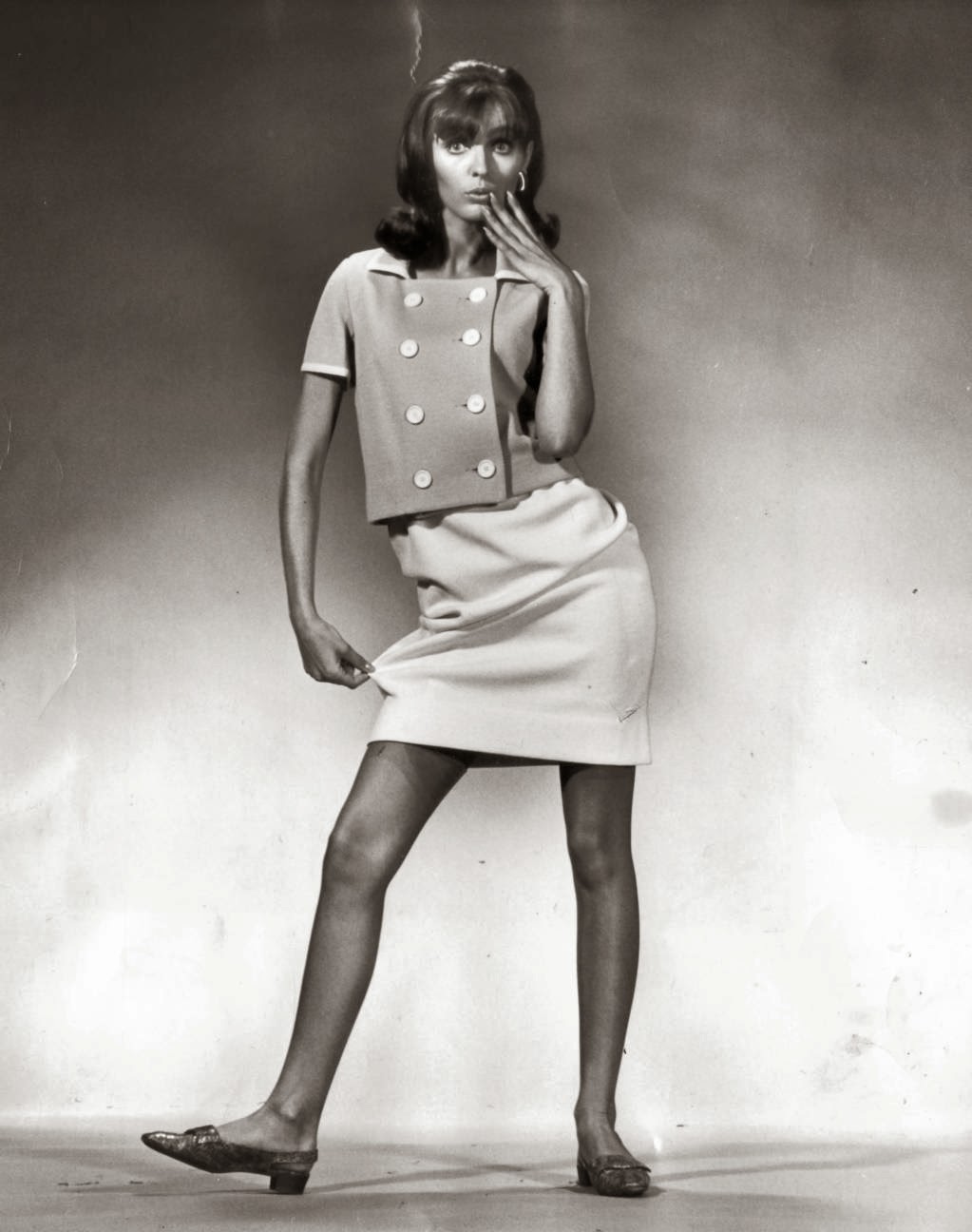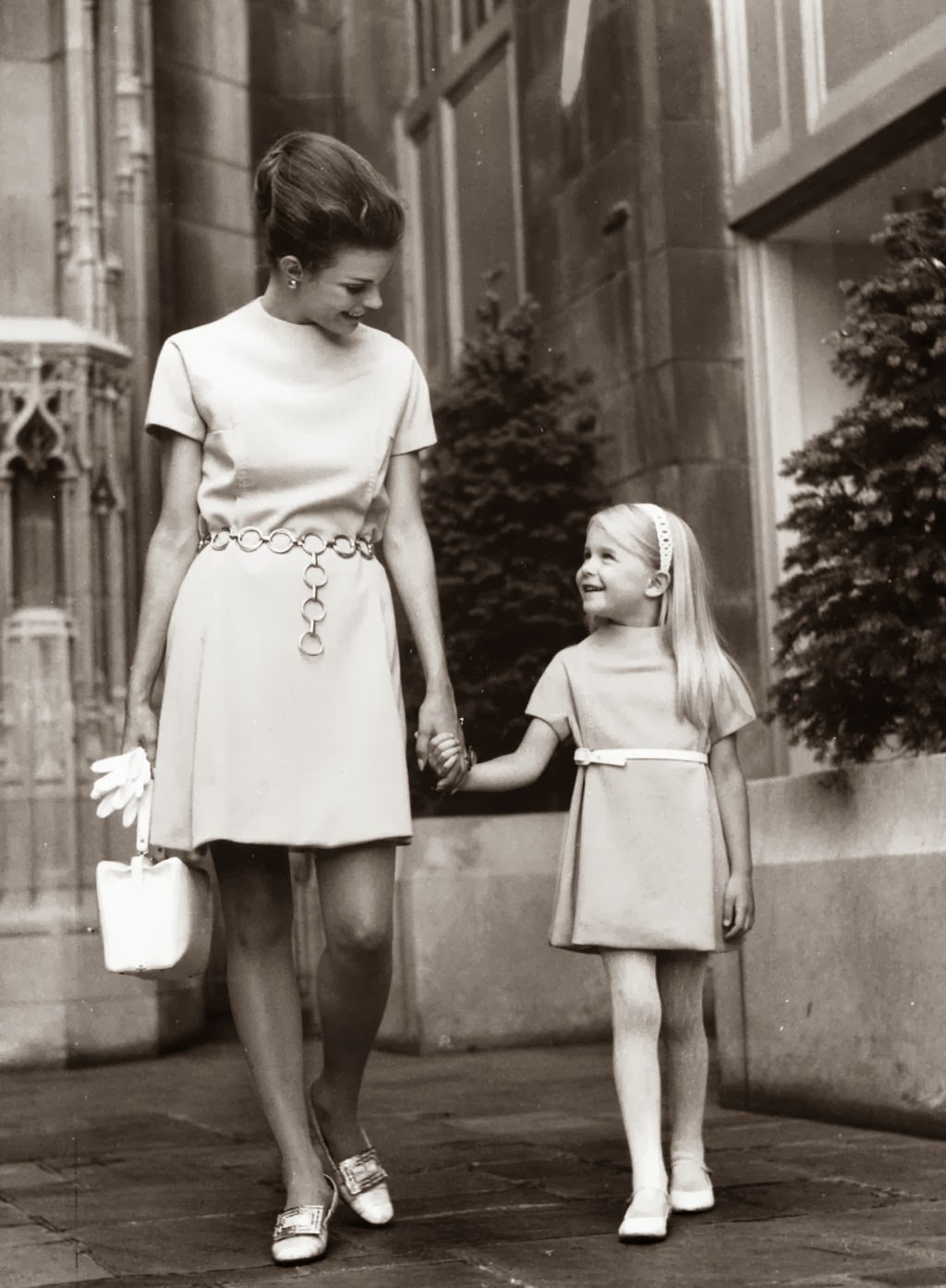Fifty years ago, British designer Mary Quant introduced the mini-skirt and women began hiking up their hemlines. And with shorter skirts came pantyhose and patterned tights, replacing girdles and garter belts. Photos of women in mini-skirts from the Chicago Tribune archive have the original published caption or supplied information.
.jpg)
|
| "Eight inches above the knee? O, No, skirts couldn't be that short...or could they?" — Tribune archive photo, June 18, 1965 |
Women in Mini-Skirts in the 1960s
.jpg)
|
| "Two London birds wear Christian Dior's striped suits, short and narrow, with emphasis on the hips. Suit at left is navy and white pin stripes, with navy blouse, pleated culottes, and horizontally striped tie. The cardigan version is in red and white stripes with scarlet socks and blouse." — UPI, May 12, 1966 |
Women in Mini-Skirts in the 1960s
.jpg)
|
| "Tiffeau's sweater dress." On the runway in New York. Recognize Lauren Hutton? — Tribune archive photo, July 7, 1966 |
Women in Mini-Skirts in the 1960s
.jpg) |
| "Bolder than ever conception of a total look comes from Yves St. Laurent, youngest member of the Paris couture. He's extended the red, white and blue chromatic scheme in this sweater dress with zigzags of the three colors. Argyle wool stockings combine muted blue and red; white leather cap with attached snood of black beaver has brass buckle, as do patent leather, chunky-heeled shoes. Model is Carol Robins of Aquinas Dominican High school." — Tribune archive photo, Sept. 10, 1966 |
Women in Mini-Skirts in the 1960s
.jpg) |
| Big blocks of color and reversible. Lavender and yellow with matching suede lavender boots. — Tribune archive photo, Sept. 14, 1966 |
Women in Mini-Skirts in the 1960s
.jpg) |
| "SLEEK CHIC NEW YORK: Chic is the word for this zippy, young shift modeled by actress Joey Heatherton. The short dress with its surge of electric stripes and leather trim is one of the "Leather Girls" designed by Don Simonelli for Mia's fall collection." — UPI, Sept. 19, 1966 |
.jpg) |
| "Abstract houndstooth checks of stretch nylon are fashioned into tights with fencer-front tunic top plus cap ($20) at Cheetah boutique." — Ron Bailey, Chicago Tribune, Oct. 10, 1966 |
Women in Mini-Skirts in the 1960s
.jpg) |
| "Venetian lace is used for this pair. Pam Kimmell, left, Wheaton high school, wears a short dress of turquoise and white lawn ($35), trimmed with giant bow and cut-outs at hemline. Teri's blue on white plaid cotton skimmer ($22.95) features wide band of lace and narrower lace edging at hem." — Earl Gustie, Chicago Tribune, Nov. 3, 1966 |
.jpg) |
| "Dressed in British designer Paul Blanche's "Raingear," a flared hipster miniskirt and Ike jacket, model Lorna McDonaugh brightens the scene at the plaza at 59th St. Such outfits could make rainy days popular." — UPI Telephoto, Nov. 9, 1966 |
Women in Mini-Skirts in the 1960s
.jpg) |
| "Gayle Kirkpatrick of Atelier uses tiger-stenciled calf for a sliplike discotheque dress secured with jeweled straps. At the Horse of a Different Color shop." — Tribune archive photo,, Nov. 14, 1966 |
.jpg) |
| "Mary Quant, the leggy, sexy London fashion designer, was her own best model for the miniskirts that dressed the decade." Quant named the brief skirt mini after her favorite car, the Mini Cooper. — UPI, Oct. 21, 1967 |
Women in Mini-Skirts in the 1960s
.jpg) |
| "Mother chose not to accent an empire waist in her dress No. 8383, instead used a smart chain belt at the normal waistline. Daughter's dress, identically styled, is made from pattern No. 8384." — Earl Gustie, Chicago Tribune, July 17, 1968 |
Women in Mini-Skirts in the 1960s
.jpg) |
| "Chic in a Mini, young lady unwraps her lunch to delight of the males." — Jack Mulcahy, Chicago Tribune, Jan. 30, 2014 |
.jpg) |
| "Kicky checkerboard pattern of the crew necked pullover (about $16) banded with two-tone stripes at hips, cuffs and neck is echoed in the high socks. Welt seamed skirt (about $11) is an easy A line." And, of course, white go-go boots, another Mary Quant innovation. 1965. — handout |
Women in Mini-Skirts in the 1960s
.jpg)
|
| "A windswept rainy fall day in Chicago, but fashion prevails come wind or high water. Only the maxi-coat seems to offer protection from the elements, but the attention of girl-watchers makes the mini the choice of most young women." — Jack Mulcahy, Chicago Tribune, Nov. 3, 1969 |



